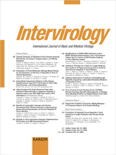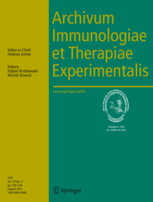
VIRAL IMMUNOLOGY
Scope & Guideline
Transforming understanding of viruses and host immunity.
Introduction
Aims and Scopes
- Immunological Responses to Viral Infections:
Research exploring how the immune system recognizes and responds to various viral pathogens, detailing cellular and humoral immune mechanisms. - Vaccine Development and Efficacy:
Studies related to the development, testing, and effectiveness of vaccines against viral infections, including innovative vaccine technologies and adjuvant strategies. - Host-Virus Interaction Dynamics:
Investigations into the molecular and cellular interactions between viruses and host cells, including mechanisms of viral pathogenesis and immune evasion. - Clinical Implications of Viral Infections:
Research focusing on the clinical aspects of viral infections, including epidemiology, treatment strategies, and long-term health effects post-infection. - Translational Research in Viral Immunology:
Studies that bridge laboratory findings with clinical applications, aiming to enhance the understanding of disease mechanisms and improve patient outcomes.
Trending and Emerging
- COVID-19 Research:
An explosion of research related to SARS-CoV-2, covering immune responses, vaccine development, long-term sequelae, and therapeutic strategies, reflecting the ongoing global health crisis. - Role of Cytokines in Viral Infections:
Increasing emphasis on understanding cytokine profiles and their implications in disease severity, particularly in the context of COVID-19 and other viral infections. - Viral Variants and Immune Evasion:
Research focusing on how viral mutations affect immune recognition and vaccine efficacy is on the rise, particularly with respect to SARS-CoV-2 variants. - Adjuvant Research in Vaccine Development:
A growing body of work is evaluating the role of adjuvants in enhancing vaccine responses, especially in populations with altered immune systems, such as the elderly or immunocompromised. - Mechanisms of Immune Dysregulation:
Emerging studies are investigating how viral infections can lead to dysregulated immune responses, contributing to chronic diseases and post-viral syndromes.
Declining or Waning
- Non-Viral Immunological Studies:
Research that primarily focuses on immunological responses not directly related to viral infections has decreased, as the journal has increasingly concentrated on viral pathogens. - Basic Virology without Immunological Context:
Publications that explore basic virology aspects without linking to immune responses or clinical implications have become less prominent, suggesting a preference for studies that integrate virology with immunology. - Older Viral Pathogens:
Research on traditional viral pathogens, such as those causing diseases that are now less prevalent or have effective vaccines, appears to be waning as newer threats (like SARS-CoV-2) dominate the field.
Similar Journals

BMC Immunology is a prominent open-access journal published by BMC that has been at the forefront of immunological research since its inception in 2000. Based in the United Kingdom, this journal aims to advance the understanding of immune system functions and disorders through high-quality, peer-reviewed articles. With an impressive scope encompassing various facets of immunology, BMC Immunology has earned a Q3 ranking in the Immunology category according to the 2023 category quartiles, demonstrating its growing impact and relevance in the scientific community. Researchers and professionals will find valuable insights in its array of published works, spanning both foundational studies and innovative applications. The journal's commitment to open access ensures that cutting-edge research is freely available, fostering collaboration and advancement in the field. For those looking to stay updated on the latest developments in immunology, BMC Immunology stands as an essential resource for researchers, professionals, and students alike.

JOURNAL OF MEDICAL VIROLOGY
Leading the Charge: Shaping the Future of Virology Research.JOURNAL OF MEDICAL VIROLOGY is a prestigious academic publication dedicated to advancing the field of virology and infectious diseases. Published by WILEY, this journal has established itself as a cornerstone within the scientific community since its inception in 1977, and it will continue to provide cutting-edge research until 2024. With an impressive impact factor that places it in the Q1 quartile for both Infectious Diseases and Virology, the journal ranks 14 out of 344 in Medicine - Infectious Diseases and 6 out of 80 in Immunology and Microbiology - Virology according to Scopus metrics. Its focus encompasses a broad spectrum of topics, including viral pathogenesis, diagnostics, treatment strategies, and epidemiology, making it an essential resource for researchers, clinicians, and students alike. Although not an open-access journal, it provides valuable insights and accessible content for subscribers and libraries. The ongoing commitment to high-quality peer-reviewed articles makes JOURNAL OF MEDICAL VIROLOGY a vital platform for disseminating knowledge and fostering innovation in virology and related fields.

INTERVIROLOGY
Pioneering insights for a viral-free future.INTERVIROLOGY is a leading academic journal dedicated to advancing the field of virology and infectious diseases, published by KARGER. With a commendable history since its inception in 1973, the journal is currently poised to explore innovative virological research through to 2024. INTERVIROLOGY is indexed with the ISSN 0300-5526 and E-ISSN 1423-0100, reflecting its commitment to maintaining high scholarly standards. The journal is categorized within the Q3 quartile for both Infectious Diseases and Virology as of 2023, demonstrating its relevance and contribution to the academic community. With Scopus rankings placing it as #130 in Infectious Diseases and #41 in Virology, INTERVIROLOGY serves as an essential resource for researchers, professionals, and students seeking cutting-edge insights and discoveries in virology. While it currently operates under a subscription model, its rigorous peer-review process ensures a high quality of published content, making it a cornerstone for those dedicated to understanding and combating viral diseases.

Virology Journal
Empowering discovery in viral pathogens and infectious diseases.Virology Journal, published by BMC, stands as a prominent open-access platform since 2004, dedicated to advancing the field of virology and infectious diseases. With its E-ISSN: 1743-422X, this journal is based in the United Kingdom and strives to disseminate high-quality research that enhances our understanding of viral pathogens and their interactions with hosts. Recognized with a Q1 classification in the category of Infectious Diseases and a Q2 in Virology for 2023, Virology Journal holds significant standing in the academic community, ranking #82/344 in Medicine - Infectious Diseases and #26/80 in Immunology and Microbiology - Virology. Its commitment to open access ensures that cutting-edge research is freely available to researchers, professionals, and students worldwide, fostering collaboration and innovation in the fight against viral diseases. The journal aims to publish original research articles, reviews, and commentaries that will stimulate discourse and spark new ideas within the virology community.

EUROPEAN JOURNAL OF IMMUNOLOGY
Cultivating Excellence in Immunology ResearchWelcome to the European Journal of Immunology, a premier peer-reviewed journal dedicated to advancing the field of immunology and allergy research. Established in 1971 and published by Wiley, this esteemed journal has been consistently ranked in the top quartile (Q1) across its categories, highlighting its significant impact within the scientific community. With an impressive Scopus ranking, the journal occupies the 64th position in Immunology and Allergy and the 74th in the broader sector of Immunology and Microbiology, demonstrating its vital role in driving innovation and knowledge in immunological studies. The European Journal of Immunology publishes high-quality original research, comprehensive reviews, and insightful commentary, making it an indispensable resource for researchers, healthcare professionals, and students dedicated to understanding the complexities of the immune system. Although not an open-access journal, it offers various subscription options to ensure that institutions and individuals can access pivotal research that shapes the future of immunology.

ARCHIVUM IMMUNOLOGIAE ET THERAPIAE EXPERIMENTALIS
Unveiling Breakthroughs in Immunology and MedicineARCHIVUM IMMUNOLOGIAE ET THERAPIAE EXPERIMENTALIS, published by DE GRUYTER POLAND SP Z O O, stands as a pivotal journal in the field of immunology, contributing significantly to the advancement of knowledge and therapy in this crucial area of medicine since its inception in 1954. With an ISSN of 0004-069X and an E-ISSN of 1661-4917, the journal operates out of Switzerland, catering to an international audience of researchers, practitioners, and students. As reflected in its Scopus rankings, the journal is positioned within the third quartile in both Immunology and Allergy (Q3) and holds a commendable second quartile in Medicine (miscellaneous) (Q2), indicating its respectable influence within the academic community. The journal publishes original research, reviews, and clinical studies, offering a platform for exploring cutting-edge developments in immunological therapies and experimental methods. Although not currently an open-access journal, it continues to thrive as a valuable resource, reflecting a commitment to disseminating high-quality research and fostering academic discourse in the field. Researchers and professionals alike will find ARCHIVUM IMMUNOLOGIAE ET THERAPIAE EXPERIMENTALIS an essential reference source for the latest advancements in immunological research and clinical applications.

Viruses-Basel
Disseminating Critical Findings in Infectious DiseasesViruses-Basel, published by MDPI, is a leading interdisciplinary journal focused on the field of virology and infectious diseases, offering a platform for the rapid dissemination of high-quality research. Established in 2009, this open access journal has become an essential resource for researchers and health professionals, ensuring that critical findings are readily available to a global audience. With an impressive Q1 ranking in Infectious Diseases and a Q2 ranking in Virology as of 2023, the journal reflects its commitment to impactful research, validated by its notable positions within Scopus categories—ranked #84 out of 344 in Medicine: Infectious Diseases and #27 out of 80 in Immunology and Microbiology: Virology. The journal adheres to high standards of academic rigor, and by embracing an open access model, it promotes unrestricted access to scientific knowledge, fostering collaboration among researchers, professionals, and students alike. Situated in Basel, Switzerland, the journal serves as a cornerstone in the dissemination of research findings related to viral diseases and their implications on public health.

Annual Review of Virology
Exploring the forefront of viral research.Annual Review of Virology is a premier scholarly journal published by Annual Reviews, dedicated to advancing the field of virology through comprehensive and insightful reviews. Since its inception in 2014, this journal has established itself as a leading resource for researchers, professionals, and students alike, achieving an impressive Q1 ranking in the field of Virology and a Scopus rank of #10 out of 80 in its category, placing it in the 88th percentile. The journal features in-depth analyses of the latest developments in virology, encompassing various aspects such as viral pathogenesis, host interactions, and antiviral strategies, thereby catering to a diverse audience seeking the most relevant and cutting-edge information. Although it is not Open Access, Annual Review of Virology remains an indispensable tool for those engaged in virology research, transforming complex findings into accessible knowledge that shapes future investigations and practical applications in the field.

VIROLOGICA SINICA
Advancing the Frontiers of Virology ResearchVIROLOGICA SINICA, published by KEAI PUBLISHING LTD, is a leading international journal dedicated to the field of virology. With an ISSN of 1674-0769 and E-ISSN of 1995-820X, this esteemed journal showcases cutting-edge research from 2006 to 2024, focusing on critical developments in Immunology, Infectious Diseases, Molecular Medicine, and Virology. As evidenced by its respectable positioning in the Q2 quartile of relevant categories and impressive Scopus rankings—such as Rank #20/80 in Virology—VIROLOGICA SINICA serves as an essential resource for researchers, professionals, and students aiming to deepen their understanding of viral pathogens and their impact on human health. While the journal does not currently offer open access, it remains an invaluable publication for those seeking to stay at the forefront of virology research. Its address is located at 16 Donghuangchenggen North St, Beijing, China, where it continues to foster academic excellence in the rapidly evolving landscape of virology.

VIRUS RESEARCH
Driving excellence in infectious disease research.VIRUS RESEARCH is a leading journal dedicated to the field of virology, published by Elsevier, and has been a cornerstone for researchers, professionals, and students since its inception in 1984. With an impressive impact factor, the journal is highly regarded, holding a Q2 category ranking in both Cancer Research and Infectious Diseases, as well as in Virology for 2023. Based in the Netherlands, it publishes high-quality, peer-reviewed articles that explore the intricate relationships between viruses and their hosts, novel therapeutic strategies, and advancements in virus biology. Researchers will find that it ranks 49th in Medicine - Infectious Diseases and 19th in Immunology and Microbiology - Virology according to Scopus, signifying its significant contribution and relevance in the academic world. VIRUS RESEARCH facilitates a platform for sharing groundbreaking discoveries, forming a vital part of the global scientific community, making it an essential read for those involved in the study of viral pathogens and their implications in medicine and biochemistry.